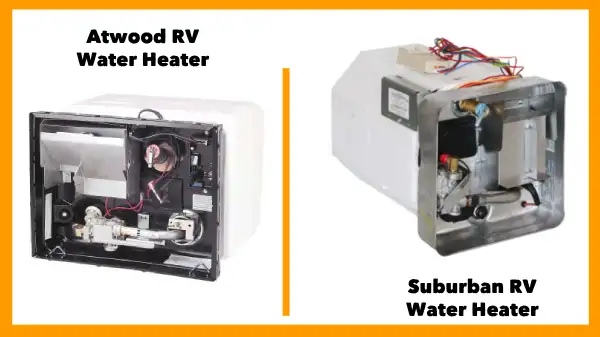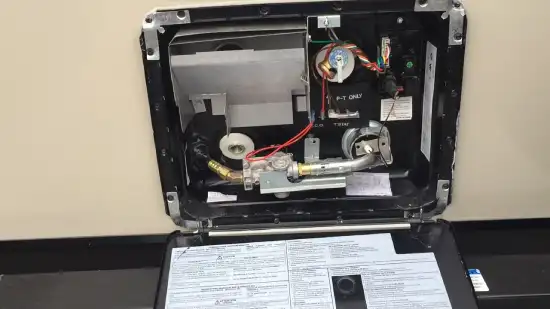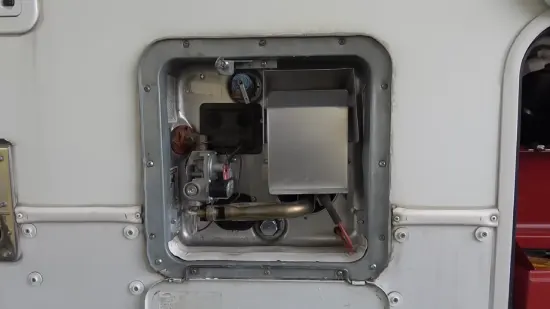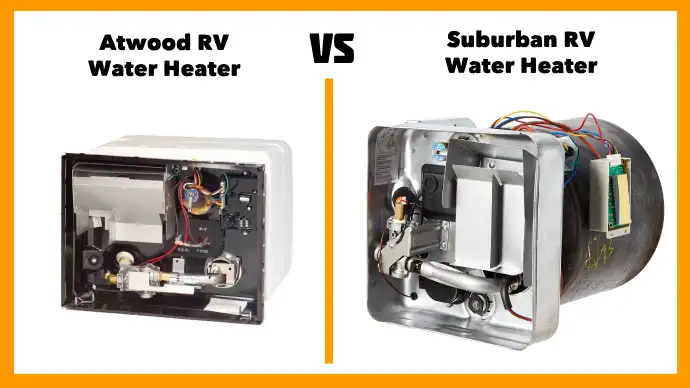Last Updated on December 24, 2023
When you’re on the road, having a reliable source of hot water can make all the difference. That’s why choosing the right RV water heater for your needs is important.
Two popular options are Atwood and Suburban RV water heaters. While they both serve the same purpose, there are some key differences between the two that you should know about before making your decision.
Atwood RV water heaters are known for their durability and efficiency. They use a unique design that allows for faster heating and better insulation, which can save you money on propane in the long run.
On the other hand, Suburban RV water heaters are often favored for their ease of installation and maintenance. They also offer a wider range of sizes and capacities, making it easier to find the right fit for your RV.
With these differences in mind, let’s take a closer look at the specifics of each brand.
Key Differences Between Atwood vs Suburban RV Water Heater

If you’re in the market for a new RV water heater, it’s important to know the key differences between Atwood and Suburban models.
One major difference is the tank material and anode rod – Atwood uses an aluminum tank and magnesium anode rod, while Suburban uses a steel tank and aluminum anode rod.
Another factor to consider is the BTU output and recovery rate, as well as the size and capacity options.
- Tank Material and Anode Rod:
- BTU Output and Recovery Rate:
- Size and Capacity Options:
- Energy Efficiency and Utility Bills:
- Durability and Reliability:
Let’s compare Atwood and Suburban RV water heaters in detail.
Tank Material and Anode Rod:
The steel tank lined with porcelain in Suburban water heaters and the absence of anode rods in Atwood water heaters made for a stark contrast in their tank materials.
The steel tank in Suburban water heaters is lined with porcelain to prevent corrosion and rust buildup. The porcelain lining is baked on the inside of the steel tank, creating a smooth surface that resists corrosion and prevents contaminants from entering the water supply.
Additionally, Suburban water heaters are equipped with an anode rod. The anode rod is made of a sacrificial metal that corrodes over time, protecting the steel tank from corrosion. The anode rod should be checked and replaced periodically to ensure optimal protection.
Alternatively, Atwood water heaters have naturally corrosion-resistant aluminum tanks. Aluminum is a lighter and more durable material than steel, making the Atwood water heater more efficient and easier to install.
The absence of an anode rod in Atwood water heaters is due to the natural corrosion resistance of aluminum. The aluminum tank is designed to withstand the harsh conditions of the RV environment, including temperature fluctuations and exposure to corrosive chemicals.
However, it is important to note that Atwood water heaters should still be periodically checked for corrosion and damage to ensure optimal performance.
BTU Output and Recovery Rate:
You’ll notice a difference in the speed of heating with the higher BTU output of Suburban water heaters, but their slightly slower recovery rates may be balanced out by the better insulation provided by the steel tank.
This means that Suburban water heaters can heat up the water in your RV faster, but they can’t keep it hot for as long.
Conversely, Atwood water heaters have a lower BTU output but faster recovery times and heating times. This means that they may take a bit longer to heat up the water initially, but they can recover and heat up the water more quickly after use.
Additionally, Atwood water heaters are designed to be lightweight, which may result in less insulation and potentially less heat retention.
Size and Capacity Options:
Suburban offers a wider range of tank sizes compared to Atwood, with options ranging from 4 gallons to 16 gallons. This provides more flexibility for RV owners who have different needs for hot water capacity. On the other hand, Atwood only offers 6 and 10 gallon options, limiting the choices for RV owners.
To further compare the size and capacity options, here’s a table showing the available tank sizes for Suburban and Atwood water heaters:
| Water Heater | Tank Sizes Available |
| Suburban | 4, 6, 10, 12, and 16 gallons |
| Atwood | 6 and 10 gallons |
It’s important to note that the choice for the right tank size and capacity will depend on the RV owner’s usage and needs. A larger tank size may be necessary for those who have more people using hot water, while a smaller tank size may be sufficient for a solo traveler or a couple.
Nonetheless, having more options for tank sizes can greatly help in finding the perfect fit for your RV hot water needs.
Energy Efficiency and Utility Bills:
As you search for the perfect hot water solution for your home on wheels, consider how much money you could save on utility bills with an energy-efficient option. Both Atwood and Suburban water heaters have models that boast energy efficiency, but there are a few key differences to keep in mind.
Atwood water heaters use a patented ‘tube-in-tube’ design that maximizes heat transfer and minimizes heat loss, resulting in more efficient performance and lower utility bills.
Suburban water heaters have a foam insulation layer that helps to reduce heat loss and improve energy efficiency, but it may not be as effective as the tube-in-tube design of Atwood models.
Some Suburban models have a high recovery rate, meaning they can heat up a large amount of water quickly, which may be useful for some RV owners who prioritize hot water availability over energy efficiency.
Atwood water heaters are designed to run on both propane and electricity, which can provide flexibility and potentially save money on fuel costs depending on your usage patterns.
Durability and Reliability:
Both Atwood and Suburban water heaters are known for their toughness and ability to withstand the demands of RVing.
Suburban water heaters, in particular, are renowned for their long lifespan and better warranty options. They have a reputation for durability and reliability, making them a popular choice for many RVers.
Atwood water heaters may have lighter aluminum tanks, but they are designed to provide consistent hot water while withstanding the rigors of RVing. They are engineered to perform efficiently, making them a reliable option for RVers who value longevity and reliability.
How long do Atwood RV water heaters last?

You can trust an Atwood RV water heater to provide you with hot water for up to 20 years and 185,000 miles, like a dependable and unyielding guardian on your travels. The durability and reliability of Atwood water heaters is unmatched in the RV industry.
Here are four reasons why Atwood RV water heaters can last so long:
1. High-Quality Materials: Atwood water heaters are made with high-quality materials that can withstand the harsh conditions of the road. They’re designed to resist corrosion, rust, and wear and tear.
2. Robust Design: Atwood water heaters are built with a robust design that can handle the stress of constant use and movement. Their sturdy construction ensures that they can withstand the bumps and jolts of the road.
3. Effective Maintenance: Atwood water heaters are easy to maintain, which helps to prolong their lifespan. Regular cleaning and inspection can prevent issues from arising, and any necessary repairs can be made quickly and efficiently.
4. Efficient Operation: Atwood water heaters are designed to operate efficiently, which can help to extend their lifespan. They use less energy to heat water, which reduces wear and tear on the system and helps it to last longer.
How do I reset my Atwood RV water heater?
To reset your Atwood RV water heater, you need to locate the white button on the back side of the heater. You can find it in the upper right corner area. Once you’ve located it, push it through the reset hole.
This will reset the ECO (Emergency Cut Off) safety feature of the heater. After you’ve reset the ECO safety feature, you need to turn the on/off switch on the side of the cover to the ‘on’ position. The switch is located on the bottom of the cover, facing the coach front.
Once you’ve turned the switch on, the heater will start functioning again. By following these steps, you can reset your Atwood RV water heater and ensure that it’s working efficiently.
What causes an Atwood RV gas water heater not to fire up?
If there’s no spark or gas, check for poor or corroded wire connections to find the cause of why your Atwood RV gas water heater won’t fire up. This is a common issue that can be easily fixed by inspecting the connections and cleaning or replacing any that are damaged.
Here are some steps to follow:
- Turn off the gas supply and disconnect the power source to the water heater.
- Locate the wire connections on the control module and inspect them for any signs of corrosion or damage.
- Use a wire brush or sandpaper to clean the connections and ensure a good electrical connection.
- If any wires are damaged, replace them with new ones of the same gauge and length.
Reconnect the power source and gas supply, and test the water heater to see if it fires up. If the above steps do not solve the problem, there may be an issue with the control module or gas valve and it may be necessary to seek professional assistance.
However, in most cases, checking and cleaning the wire connections will resolve the issue and get your Atwood RV gas water heater firing up again.
Why is my Suburban RV water heater not getting hot enough?
If you’ve been having issues with your Atwood RV gas water heater, it can be frustrating. But now that you know what might cause it not to fire up, let’s talk about another common issue – a Suburban RV water heater not getting hot enough.
There are a few reasons why your Suburban RV water heater might not be getting hot enough. One possible cause is that the thermostat isn’t functioning correctly. This can happen if it’s faulty or damaged.
Another reason could be that the water temperature is set too low, which can happen if it was accidentally adjusted to a lower temperature. Lastly, a broken or damaged dip tube can allow cold water to mix with hot water at the top of the water heater, resulting in lower temperatures.
How long does it take for a Suburban water heater to heat up?

You’re probably wondering how long it takes for your Suburban water heater to heat up. On average, it takes about 20 minutes for six gallons of water to reach the desired temperature. This time frame may vary depending on the outside temperature and the initial temperature of the water.
It’s important to note that if you’ve used up the six gallons of hot water, you will need to wait another 20 minutes for the water to heat up again. This is due to the fact that the water heater needs to start from scratch and reheat the water all over again.
However, if you’re looking to save time, you can always invest in a larger water heater that can hold more water and heat it up faster.
How long do Suburban water heaters last?
Now that you know how long it takes for a Suburban water heater to heat up, let’s talk about how long they last.
Based on the average lifespan of a tank RV water heater, you can expect your Suburban water heater to last anywhere from 10 to 15 years. However, this lifespan can vary depending on a few factors.
One factor that can affect the lifespan of your Suburban water heater is the amount of use it gets. If you’re a full-time RVer who uses their water heater constantly, it may not last as long as someone who only uses it occasionally.
Additionally, the quality of the water in your RV can also impact the lifespan of your water heater. Hard water that contains minerals like calcium and magnesium can cause buildup in your water heater, which can lead to damage and a shorter lifespan.
Get Ready for Your Road Trip with the Best RV Water Heater – Atwood vs. Suburban
By now, you should have a good grasp on the key differences between Atwood and Suburban RV water heaters, as well as some troubleshooting tips for common issues that may arise.
It comes down to personal preference and specific needs when choosing between the two brands. Atwood water heaters are known for their durability and long lifespan, while Suburban water heaters offer faster heating times and higher maximum temperatures.
Regardless of which brand you choose, remember to properly maintain and care for your RV water heater to ensure it lasts as long as possible. And if you ever have any issues, don’t hesitate to consult the manufacturer’s manual or reach out to a professional for assistance.
So, whether you’re hitting the road for a weekend getaway or a cross-country adventure, make sure your RV water heater is functioning at its best. After all, there’s nothing better than a hot shower to start your day off right – an anachronism that still holds true even in our modern times.
Happy travels!



